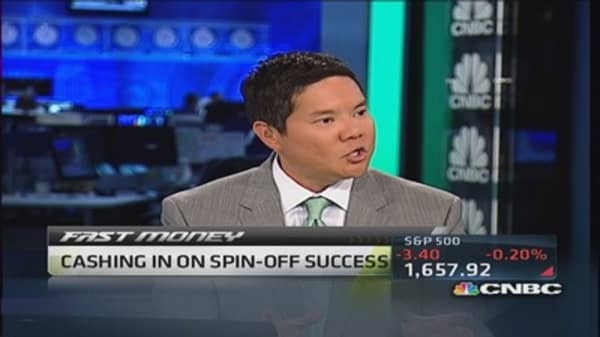Julie Morris, a research analyst for Beacon Trust, has analyzed the performance of spinoffs and found that they historically tend to outperform their parent companies by about 22 percent in their first year. She pointed out that if you look at spinoffs' performance versus the broader market, the returns also are impressive. Beacon Trust, which owns the Spin-Off Index, is a subsidiary of The Provident Bank.
On average, those spinoffs also beat the S&P 500 by about 18 percent in their first two years as independent companies, Morris said.
For example, she pointed to oil and gas refiner Phillips 66, which was spun off from ConocoPhillips in May 2012. Since then, Phillips 66 shares have risen 74 percent. Meanwhile, ConocoPhillips shares have risen 17 percent. Other index constituents have had similar performance stories.
There are a number of reasons for the general outperformance, one being the more pointed focus on managing a simpler business. Sometimes, managers at spinoffs also have incentive compensation plans that are tied directly to company performance. That extra motivation could have a marked impact.
That's not to say that just blindly buying any spinoff will make money for investors. History has been littered with instances where those companies don't end up doing well. One such laggard is water technology company Xylem, which was spun off from ITT in October 2011. ITT shares have surged 124 percent since then; Xylem has fallen 9 percent in that same period.
However, since the inception of the index in 2006, the index overall has performed relatively well. It has outperformed the S&P 500 each year except 2008. There are risks associated with any kind of investing.
(Read more: Beware: Market valuation looks like 2007 again)
Morris says that companies tend to sell off in the days after they've been spun off. That's when shareholders often sell their spinoff shares to raise cash.
And, if the spinoff isn't part of an index that its former parent company was, there could be selling pressure on those shares, too. The Beacon Spin-off Index accounts for this by not including a spinoff in the index until it has been a standalone company for six months. There's also an inherent risk when investing in spinoffs, as they don't have a track record of their own or a long trading history.
For those believing Morris' story about spin-off investing, there is an exchange-traded fund that tracks the performance of this index, the Guggenheim Spin-Off ETF, around since December 2006.
Morris said spun off companies are more difficult to understand and often trade at a discount.
She also said that because spin-offs don't get as much attention from analysts, there tend to be opportunities to find pricing discrepancies to capitalize on.
As with all investments, there are risks and investors should certainly consult their financial advisors, but spinoff investing could be an area to pay attention to, regardless of whether you're bullish or bearish on the thesis.
—By CNBC's Dominic Chu (Follow Dominic on Twitter: @TheDomino)





